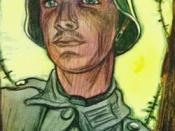"All Quiet on the Western Front" is an honest work by Remarque, detailing what is depicted as the highest honor and regard of a soldier, comradeship. Paul Baumer, along with his friends learn the hard way that comradeship is the solely what they have on the front. As they enlist and join the army together, and through losing their innocence, risking their lives, risking their lives for each other, and surviving on animalistic instincts, they form a unique brotherhood and camaraderie.
The first true step of their camaraderie began with prior friendships that they built upon. Paul and his friends were mostly classmates who were all encouraged to join the armed forces and fight for their homeland together. Without the patriotic lectures of Kantorek, they would not have volunteered for their destiny. They entered the war as young boys with idealistic views of war and patriotism as Kantorek supplied.
One by one those views diminished. Living as army soldiers, they began to understand differently; patriotism, what brought them to the war, left them immediately just as others left them by way of dying.
Paul and his friends alike lost their innocence by becoming soldiers. The ideals that romanticized war as a love story to patriotism were soon begotten to pure survival. As early as the end of chapter one, Paul has come to the realization that war will change their lives forever. He and his friends are no longer young, like Kantorek believes, but are now beyond their years. "Yes, that's the way they think, these hundred thousand Kantoreks! Iron Youth! Youth! We are none of us more than twenty years old. But young? Youth? That is long ago. We are old folk." (18) Paul and his friends have left the youth together, now reform as old folk,


